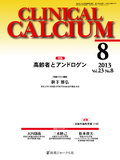Japanese
English
- 有料閲覧
- Abstract 文献概要
- 1ページ目 Look Inside
- 参考文献 Reference
近年の研究により,アンドロゲンやエストロゲンが海馬で独自に合成されていることが,明らかになってきた。ステロイドの合成酵素や受容体はグルタミン酸神経に沿って発現している。しかし,合成酵素のmRNA や蛋白のレベルは精巣・卵巣の数百分の一である。しかしながら,海馬内のアンドロゲンやエストロゲン濃度は血中から来る濃度よりずっと多い。これは,血管体積の数百分の一体積が小さい海馬で計算するのでこうなるのである。一方,作用研究からは,アンドロゲンやエストロゲンは,記憶中枢の海馬の神経回路のシナプスに早く・強く作用することがわかってきた。更年期を過ぎると,海馬の性ステロイド合成能は衰え(卵巣・精巣の合成能は脳より早く衰える),アンドロゲンやエストロゲンの脳内の濃度は低下し,その結果,記憶能力が低下して 認知症・アルツハイマー病・うつ病などになると考えられる。性ホルモン補充療法は記憶機能回復に有効であり,臨床的にも重要な分野である。
Recently, brain synthesis of androgen and estrogen has been extensively investigated. Steroidogenic enzymes and receptors are expressed in glutamatergic neurons. The expression levels of mRNA or proteins for enzymes are as low as 1/200~1/1,000. However, hippocampal levels of androgen and estrogen are much higher than those of plasma. This is due to the fact that the volume of hippocampus is as small as 1/200 of the blood vessels. Androgen and estrogen can rapidly modulate synaptic plasticity of neural circuits. After andropause or menopause, the levels of androgen and estrogen in the hippocampus may significantly decrease, inducing dementia, Alzheimer's or depression. Hormone replacement therapy is valid for rescue of memory function, therefore synthesis and action of hippocampal androgen and estrogen is an important field for investigations.



